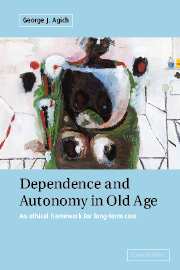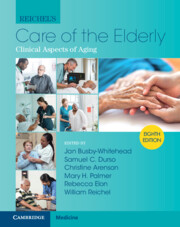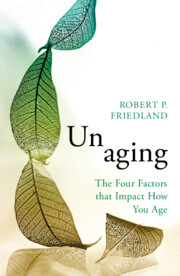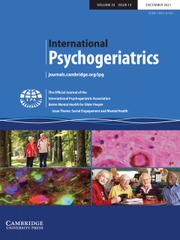Dependence and Autonomy in Old Age
Respecting the autonomy of disabled people is an important ethical issue for providers of long-term care. In this influential book, George Agich abandons comfortable abstractions to reveal the concrete threats to personal autonomy in this setting, where ethical conflict, dilemma and tragedy are inescapable. He argues that liberal accounts of autonomy and individual rights are insufficient, and offers an account of autonomy that matches the realities of long-term care. The book therefore offers a framework for carers to develop an ethic of long-term care within the complex environment in which many dependent and aged people find themselves. Previously published as Autonomy and Long-term Care, this revised edition, in paperback for the first time, takes account of recent work and develops the author's views of what autonomy means in the real world. It will have wide appeal among bioethicists and health care professionals.
- Translates the abstractions of ethical analysis into the real world of long-term care
- Provides an ethical framework for people caring for the elderly
- Builds on the author's earlier book Autonomy and Long-term Care, of which this is a revised edition, now in paperback for the first time
Reviews & endorsements
"This is an excellent text on an important topic. The author's empathic understanding of the issues involved in the long-term care of frail older individuals makes this book one not only of useful instruction but also of sprirtual inspiration." Leila Toiviainen, University of Tasmania, Australia, Nursing Ethics
"This book has been hailed by critics as a milestone in medical ethics...It challenges clinicians to reexamine many of the ethical principles on which they have based their interactions with patients in long-term care." New England Journal of Medicine
"I found this book to be a fascinating read, one that made me pause, examine and re-examine the author's premises. I especially appreciate the author's phenomenological approach and his discussion of autonomy in the framework of four themes: space, time, communication, and affectivity and the role of autonomy in the choices of everyday life for older adults needing long-term care because of increasing frailty." Doody's Review Service*****5 Stars!
Product details
September 2003Paperback
9780521009201
218 pages
229 × 155 × 13 mm
0.376kg
Available
Table of Contents
- 1. Introduction
- Long-term care images
- Autonomy
- Autonomy and long-term care: the problem
- 2. The liberal theory of autonomy
- Pluralism, toleration, and neutrality
- The State and positive autonomy
- Some problems of positive autonomy
- Liberal principles in long-term care
- Nursing home admission practices
- The use of restraints
- The perils of liberal theory
- Communitarianism and the contextualist alternative
- Practical implications of the debate over the foundation of ethics
- Conflict and conversation
- The function of rights
- Limitation of rights
- Paternalism and the development of persons
- From paternalism to parentalism
- Summary
- 3. Long-term care: myth and reality
- Myths of old age
- Nursing homes
- Therapeutic relationships
- Concepts of illness and disease
- Models of care
- The concept of a practice
- Home care
- Summary
- 4. Actual autonomy
- Result-oriented theories
- Action-oriented theories
- The concrete view of persons
- Autonomy: a developmental perspective
- Narrative approaches
- Dependence in human development
- Sickness as dependence
- Autonomy and identification
- The paradox of development and problems of identification
- Implications for long-term care
- Summary
- 5. A phenomenological view of social action
- Sociality and the everyday world
- General Features of the social nature of persons
- Space
- Time
- Communication
- Affectivity
- Summary
- 6. Autonomy and long-term care: another look
- Social reality of Eastside
- Appeal to autonomy as independence
- A phenomenologically informed analysis
- Lessons from Eastside
- Conclusion
- Bibliography
- Index.






